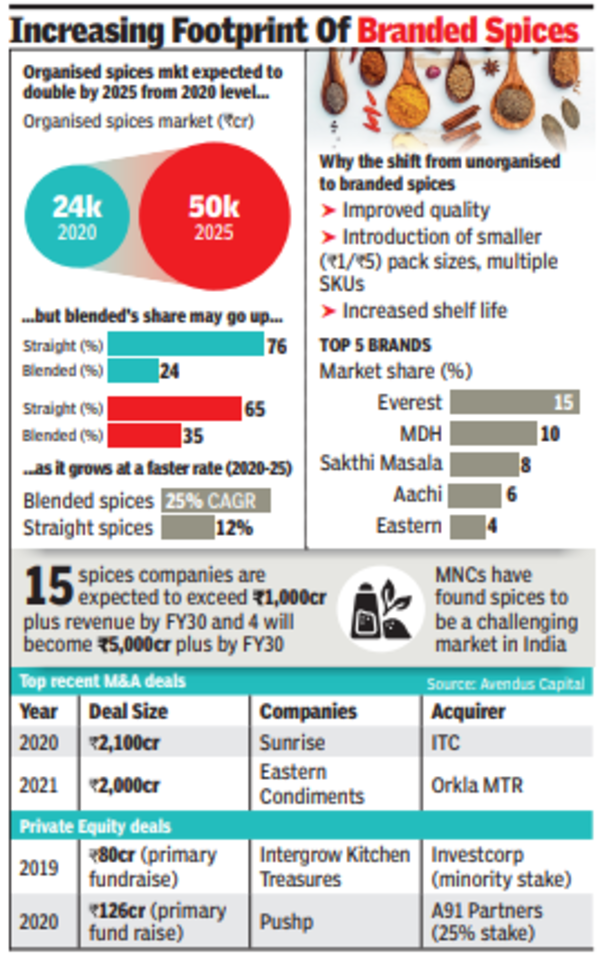What is the controversy?
Hong Kong and Singapore have stopped the sale of spices from two popular Indian brands MDH and Everest. The action came after the authorities detected presence of ethylene oxide beyond permissible limits. Some specific spices from these two brands have also come under the scanner of Australia’s Food safety agency. Some reports have said that the US FDA is also looking into products of these two brands. Ethylene oxide is a known carcinogen that can cause DNA damage and disrupt cellular function, leading to the development of various types of cancers over time, says experts.
What do the firms say?
Both Everest and MDH have said that they adhere to strict hygiene and safety standards. Everest has said that its products have not been banned in Hong Kong and Singapore. “Only one out of 60 Everest products has been held for examination. We reassure our customers that our products are safe and of high quality, so there is no need for concern,” the firm has said.

MDH (Mahashian Di Hatti) has said the company has not received any communication from regulatory authorities of Singapore or Hong Kong and such claims are untrue, lacking any substantiating evidence. The over 100-year-old brand, which is a household name in India, said that it does not use ethylene oxide at any stage of storing, processing or packaging its spices.
What has been the response of the regulator, govt?
The food safety regulator – the Food Safety and Standards Authority of India (FSSAI) – announced a nationwide check on all manufacturers of spices. The Spices Board of India has also stepped up action, mandating strict checks on food products sold domestically and those for exports. Authorities have reiterated that food safety standards in the country are comprehensive to ensure quality. The FSSAI has also rejected reports as “misleading and baseless”, which claimed that Indian herbs and spices contain “elevated levels of pesticides.” Authorities have also unveiled stringent checks on the unorganised sector as well in several parts of the country.
What do experts say?
Loose enforcement of rules governing food processing has much to do with Indian companies failing safety tests. Besides, there is a lack of infrastructure – govt does not have the right testing labs and also adequate number of people who can go and test products on the ground, said Ravindra Yadav, partner at Technopak Advisors. “We have still not been stringent enough on how to regulate such kinds of malpractices by companies.”
Veena P Panicker, head of biomonitoring-India, at Merck Life Science, said export regulations are very different in every country and it is critical for companies to have adequate knowledge about the regulatory aspects governing each country. She said the knowledge gap is the biggest challenge. “The second issue is around awareness of test methodologies. Companies need to comply with standardised SOPs (standard operating procedure) created for such tests,” said Panickar.
Why is it a big deal for the sector?
The controversy comes at a time when the sector has been witnessing robust growth. While the sector has faced such issues earlier too, the timing of the action is likely to hurt sales for some time now. Indian spices have gathered worldwide fame, and thanks to the Indian diaspora, sales have soared over the years. According to Avendus Capital, spices make up the most attractive segment under the food category with blended spices expected to reach 35% of the total organised business by 2025.
!(function(f, b, e, v, n, t, s) {
function loadFBEvents(isFBCampaignActive) {
if (!isFBCampaignActive) {
return;
}
(function(f, b, e, v, n, t, s) {
if (f.fbq) return;
n = f.fbq = function() {
n.callMethod ? n.callMethod(…arguments) : n.queue.push(arguments);
};
if (!f._fbq) f._fbq = n;
n.push = n;
n.loaded = !0;
n.version = ‘2.0’;
n.queue = [];
t = b.createElement(e);
t.async = !0;
t.defer = !0;
t.src = v;
s = b.getElementsByTagName(e)[0];
s.parentNode.insertBefore(t, s);
})(f, b, e, ‘https://connect.facebook.net/en_US/fbevents.js’, n, t, s);
fbq(‘init’, ‘593671331875494’);
fbq(‘track’, ‘PageView’);
};
function loadGtagEvents(isGoogleCampaignActive) {
if (!isGoogleCampaignActive) {
return;
}
var id = document.getElementById(‘toi-plus-google-campaign’);
if (id) {
return;
}
(function(f, b, e, v, n, t, s) {
t = b.createElement(e);
t.async = !0;
t.defer = !0;
t.src = v;
t.id = ‘toi-plus-google-campaign’;
s = b.getElementsByTagName(e)[0];
s.parentNode.insertBefore(t, s);
})(f, b, e, ‘https://www.googletagmanager.com/gtag/js?id=AW-877820074’, n, t, s);
};
function loadSurvicateJs(allowedSurvicateSections = []){
const section = window.location.pathname.split(‘/’)[1]
const isHomePageAllowed = window.location.pathname === ‘/’ && allowedSurvicateSections.includes(‘homepage’)
if(allowedSurvicateSections.includes(section) || isHomePageAllowed){
(function(w) {
var s = document.createElement(‘script’);
s.src=”https://survey.survicate.com/workspaces/0be6ae9845d14a7c8ff08a7a00bd9b21/web_surveys.js”;
s.async = true;
var e = document.getElementsByTagName(‘script’)[0];
e.parentNode.insertBefore(s, e);
})(window);
}
}
window.TimesApps = window.TimesApps || {};
var TimesApps = window.TimesApps;
TimesApps.toiPlusEvents = function(config) {
var isConfigAvailable = “toiplus_site_settings” in f && “isFBCampaignActive” in f.toiplus_site_settings && “isGoogleCampaignActive” in f.toiplus_site_settings;
var isPrimeUser = window.isPrime;
if (isConfigAvailable && !isPrimeUser) {
loadGtagEvents(f.toiplus_site_settings.isGoogleCampaignActive);
loadFBEvents(f.toiplus_site_settings.isFBCampaignActive);
loadSurvicateJs(f.toiplus_site_settings.allowedSurvicateSections);
} else {
var JarvisUrl=”https://vsp1jarvispvt.indiatimes.com/v1/feeds/toi_plus/site_settings/643526e21443833f0c454615?db_env=published”;
window.getFromClient(JarvisUrl, function(config){
if (config) {
loadGtagEvents(config?.isGoogleCampaignActive);
loadFBEvents(config?.isFBCampaignActive);
loadSurvicateJs(config?.allowedSurvicateSections);
}
})
}
};
})(
window,
document,
‘script’,
);







More News
Exports may grow 10-15% to $900bn in FY25 – Times of India
Large PSUs spend over Rs 50,200cr in capex in April – Times of India
L&T may exit Hyd metro as free bus rides hurt biz – Times of India